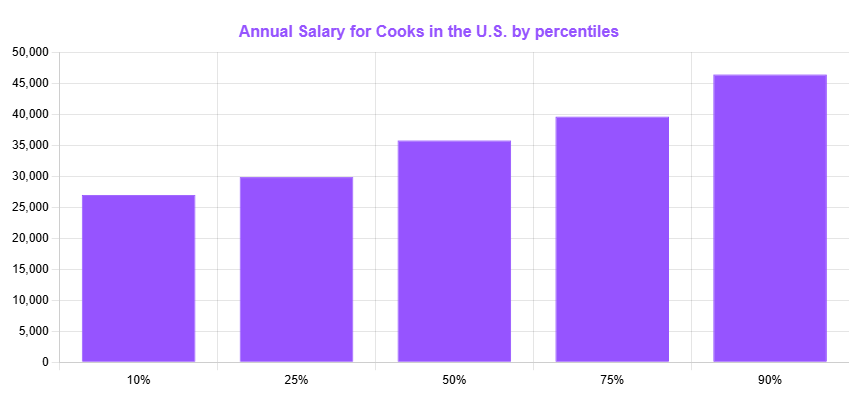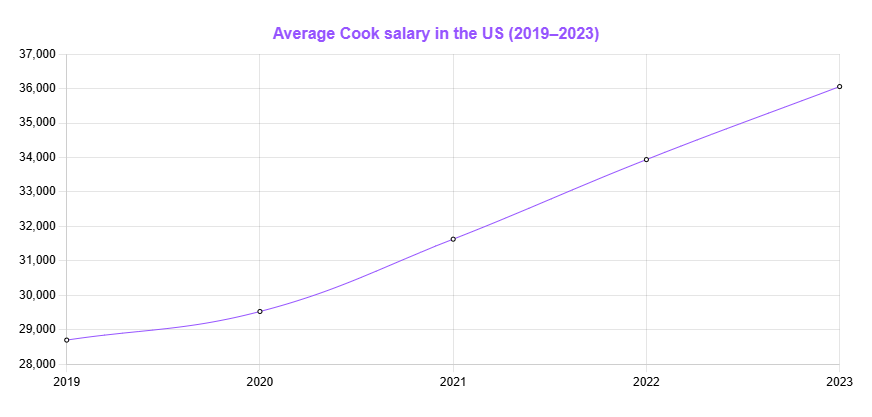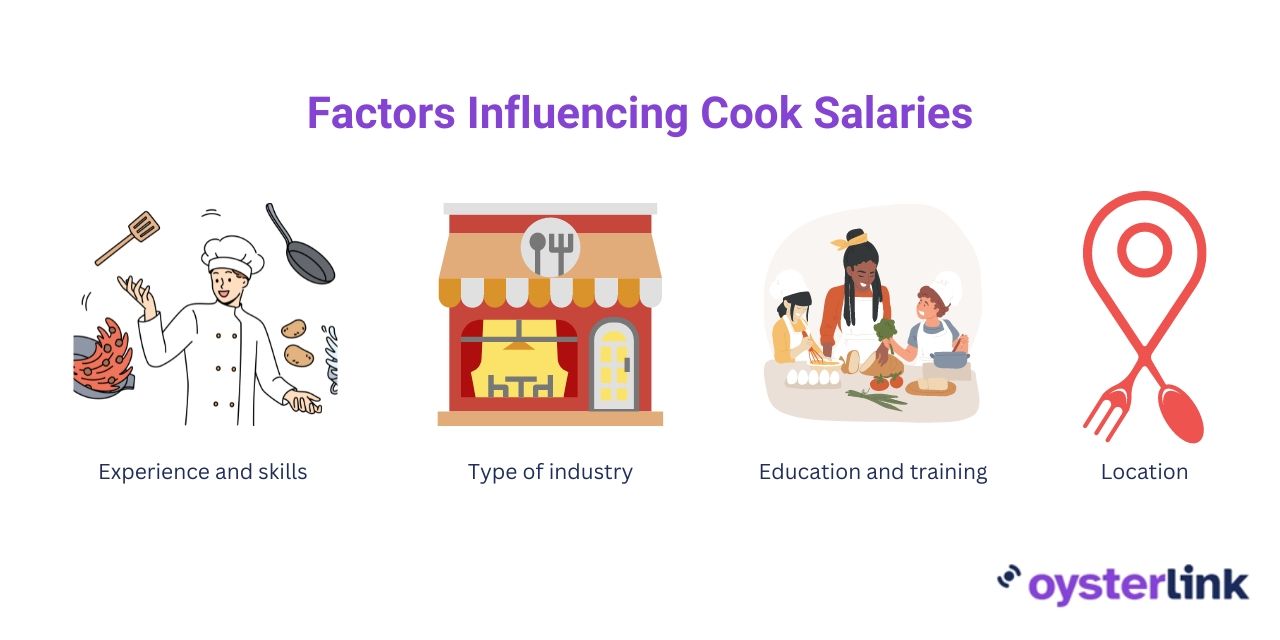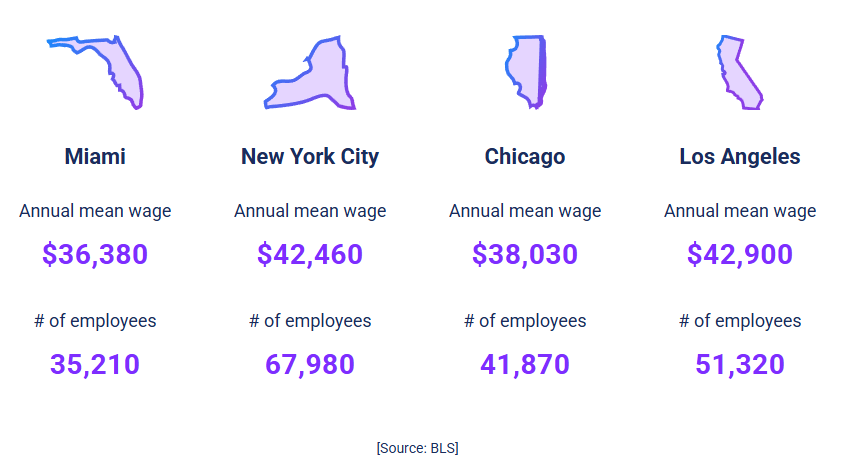Cook Salary in 2025: A Comprehensive Guide
How Much Does a Cook Earn in the United States?
The average Cook salary in the United States (U.S.) is $3,005 a month or $36,060 per year, according to our salary estimate methodology.
Some Cooks may earn as little as $26,980 annually, placing them at the 10th percentile. Others might earn as much as $46,420 per year, positioning them at the 90th percentile of all Cook earners.
If you're in the 90th percentile, you earn more than 90% of Cooks working in the U.S. However, if you're in the 10th percentile, that means you earn less than 90% of working Cooks.
See the Cook salary breakdown according to the percentile below as per the Bureau of Labor Statistics (BLS):

[Source: BLS]
Cook Salary by Year
Explore the chart below to see how Cook salary averages progressed throughout the years from 2019 to 2023.

[Source: BLS]
How Much Does a Cook Earn Monthly?
The average monthly Cook salary in the U.S. is approximately $3,005.
How Much Does a Cook Earn Weekly?
The average weekly salary for a Cook in the U.S. is approximately $694.
How Much Does a Cook Earn Hourly?
On average, Cooks earn an hourly wage of $17.
Know your yearly, monthly, weekly and hourly pay with ease using our Salary to Hourly Calculator below.
4 Factors Affecting Cook Salaries
There are several factors that influence the salary of a Cook. Some of the main ones are:

1. Experience and skills
Experienced Cooks with years in the hospitality industry have likely gained more skills that help them perform their role more effectively. As a result, employers may be more willing to offer them higher pay.
Additionally, after spending a significant amount of time working in a restaurant, Cooks will often specialize in a specific type of cuisine, increasing their potential earnings in establishments that offer dishes that align with the Cook's expertise.
2. Type of industry
Cook salaries can greatly vary based on the type of industry in which they work. Those working in fine-dining restaurants or hotels typically earn higher salaries than those working in fast-food chains or institutional kitchens.
You can explore the Cook salaries across industries in the below chart:

[Source: BLS]
3. Education and training
Formal culinary education or specialized training can positively affect a Cook's earning potential.
Engaging in structured educational programs, such as culinary schools or apprenticeships, equips Cooks with a comprehensive understanding of culinary principles, techniques and industry standards.
Moreover, specialized training in niche areas of the culinary arts, such as pastry making or international cuisine, can make you stand out in the competitive Cook job market. Certification or accreditation from culinary associations can also put a higher value on Cooks' earnings.
You can learn more about Cook accreditation and education on our How To Become a Cook page.
4. Location
Location is another factor that can influence the earnings of Cooks. Simply put, a Cook's salary can vary from state to state and even from city to city. Explore how the Cook's salaries can vary in the next section.
Best-Paying States and Districts for Cooks
The table below offers insights into the varying salaries of Cooks throughout the U.S.
Explore each state and district to understand the differences and gain a deeper understanding of the disparities in earning potential among Cooks within the hospitality sector.
Some of the top-paying states for Cooks include:
- Hawaii: $45,060
- Washington: $44,410
- Massachusetts: $43,420
On the other hand, Cooks working in the following states can expect to earn salaries on the lower end of the spectrum:
- Louisiana: $29,270
- Mississippi: $29,010
- West Virginia: $28,090
Cook Take-Home Pay Per State
Now that you know the average Cook salary for your state, know how much you earn by the end of the day after taking the necessary state-imposed taxes and other deductions into consideration with our Paycheck Calculator below.
High-Paying Cities for Cooks
Among the following four major U.S. cities, Los Angeles ($42,900) is the top-paying one for Cooks followed by:

Non-Monetary Benefits and Perks for Cooks
Aside from salaries, non-monetary perks and job benefits Cooks receive can influence their earning potential for the better.
Explore some of the top benefits and perks for Cooks across the U.S.
Professional development opportunities
If the establishment you work for provides you with additional certification opportunities or skills enhancement workshops, you can continue to sharpen your skills and advance in your career. This will help you feel appreciated and valued as you will be supported on your career journey.
Health benefits
Most restaurants and dining establishments offer health benefits to their cooks. These include medical, dental and vision insurance plans.
Professional Cooks who have such benefits would not need to worry so much about health-related expenses, making them less anxious in situations in which they have to seek help.
Paid time off
According to Forbes, only 43% of hospitality workers have access to paid time off.
However, Cooks who do have access to this benefit can enjoy alleviated stress from knowing that they can take a much-needed rest without worrying how it will affect their income.
How Much Do Similar Careers to a Cook Get Paid?




